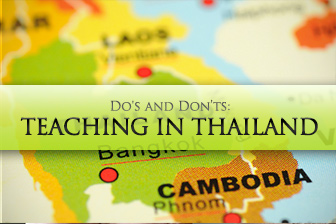12 Tips for Adapting to Thai Culture


Some things relate specifically to the classroom, whilst other things apply to living in Thailand in general. In addition to a different language, weather, food, and traditions, there are different cultural standards and societal expectations. Common practices in one country can be a major source of offence in another. Below are some useful pointers that can help you keep on track whilst in Thailand.

In Thailand, as a rule of thumb, your shoulders should be covered and dresses or skirts worn to work should reach to your knee. Thais are fairly conservative in their dress standards, and although you may see some of the younger Thai teachers wearing very short skirts, you should avoid doing the same unless you want to be reprimanded. Schools usually prefer men to wear to wear full button up shirts. If you are unsure as to what you are expected to wear in the classroom, ask someone.
Some schools will expect teachers to wear tops corresponding to the colour of the day. If you are told to wear certain colours on certain days, do so. Monday is yellow, Tuesday is pink, Wednesday is green, Thursday is orange, and Friday is light blue. There are other days where you may be told to wear certain colours; these are usually birthdays of members of the Royal Family and special religious days. On the King’s birthday, for example, you will be expected to wear yellow, regardless of what day of the week it as, as the King was born on a Monday.
The 'wai' is a sign of respect, and is used to greet people, bid farewell, apologise, give thanks, and in a whole host of other social situations. If somebody wais you, you should return the gesture. If you see someone in your school who is older or holds a more senior position that you, you should wai them first.
Although many beliefs may be different to your own, always show respect for the beliefs of others.
It is customary to remove your shoes before entering a home, as well as some offices and shops. A helpful hint is that if there are piles of shoes outside a doorway, you should also remove yours. Some schools may require that you remove your shoes outside the classroom. It is best to ask if you are unsure. If you do need to take your shoes off in the classroom, cast your eyes around the floor for any sharp objects before you start your lesson. One time when I forgot to do this I ended up with a strip of staples embedded in my heel and dripping blood whilst completing the alphabet song. It was painful!
Whilst you will not need to use Thai in the classroom, and some schools actually specifically prohibit foreign teachers from using any Thai, a few basics can really help you outside of your school. This is particularly useful in more rural areas where many locals will not be able to speak any English.
Every morning at 8am the Thai National Anthem is played. Most schools will hold a small flag raising ceremony at this time on some days of the week. It is important that you attend this ceremony unless specifically told that you do not have to. I have worked in a school where a flag ceremony was held every morning. I have also worked in a school that only held a ceremony on Mondays and Fridays.
The National Anthem is played every day at 8am and 6pm. You should stand still for the duration of the song. This is especially important if you are walking around your school, in a bus station, or in a similarly public place. The Royal Anthem is played in cinemas before movies start; patrons are expected to stand throughout this song also.
The Thai way of life can be much slower than the quicker pace that most westerners are used to. There is nothing that you can do to change this, so be patient and accept the differences.
Embrace the new challenges of living and working in a different country and have fun!

Thais rarely show anger or extreme emotions in public. If you do either, you will often be considered as being slightly unhinged. Although you may need to shout in a classroom to be heard and make students be quiet, do so in a controlled way. Do not become angry in the classroom, no matter what happens. If you lose your temper, students will probably laugh at you, which will make you feel even worse.
A person’s head is considered the most spiritual part of their body, and to touch someone on the head can be very disrespectful.
The feet are seen as being the lowest part of the body and so using the feet to point, or directing the feet towards someone or something, is seen as the height of rudeness.
Buddha images are sacred in Thailand. You should not climb on statues for pictures or act in an inappropriate manner near statues or pictures. You should point your feet away from Buddha images. In some areas, posing for photographs in front of Buddha statues is considered offensive.
Buddhism and The Royal Family are both highly revered in Thailand. Whilst you should avoid criticizing either in any situation, it is best to also avoid these topics altogether in the classroom. Interestingly, be aware that speaking badly of The Royal Family is actually a criminal offence and punishable under the Lese Majeste Laws.
This was something that I found difficult to understand when I first started teaching in Thailand. Many schools operate a no fail policy. This means that if you are asked to test students, you can do a lot of work, assign fair grades, and then the grades will ultimately be altered. It can seem very pointless, but it happens very commonly. Understand it happens, accept that you cannot change it, and do not take it personally.
Almost all forms of gambling are illegal in Thailand. Cards are associated with gambling, even if there is no gambling actually taken place. There are many great ESL activities that use cards; do not use them in a Thai school. I have known people get into a lot of trouble for innocently doing so.
I would say do not ride a motorbike unless you have a license to do so, but so many people, myself included, hire motorbikes for convenience. With a high death toll on the roads, and uncountable accidents involving motorbikes, do not be tempted to think that riding a motorbike is easy. You would not do it at home, so don’t do it in Thailand. The rules of the road and road conditions are certainly different to in your home country. Take some instruction before hitting the roads, and don’t ride if you are not confident. And, always wear a helmet, even as a passenger.
Thailand is known for its hedonistic areas, where almost anything goes. It also has strong anti-drug laws. Not only is it very unprofessional as a teacher to mess around with drugs, but it could also land you in a lot of trouble with the law if caught.
Some schools, as well as most streets, have stray dogs roaming around. Temple schools especially have a lot of dogs walking around. They may wander into your classroom and your students may be perfectly fine with them. It is wise not to pet any stray dogs, whether in your school or on the street. They are not domesticated pets like you are used to, they probably have not had any rabies vaccinations or other health care, and they can be very unpredictable.
You will no doubt quickly find your own dos and don’ts to add to this list, and it is not meant to be an inclusive and definitive guide of how to act. Hopefully, though, these tips will stand you in good stead for your first few weeks of living and working in The Land of Smiles.
Are there any vital tips about teaching in Thailand that you feel have been omitted and would be useful for others?